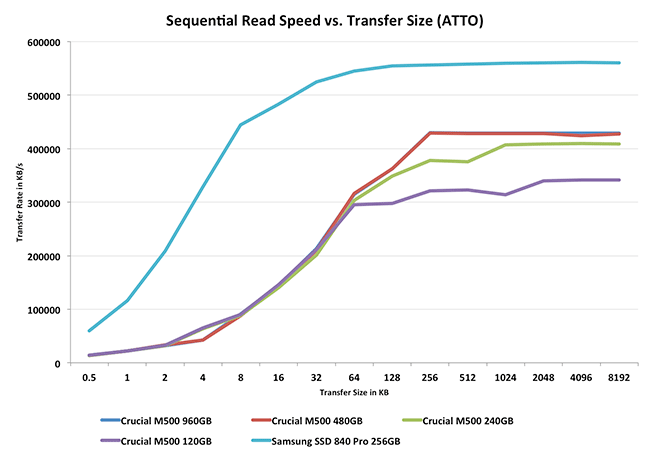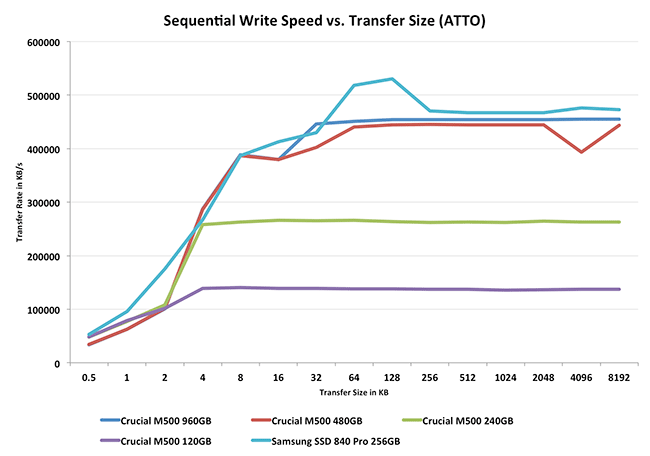The Crucial/Micron M500 Review (960GB, 480GB, 240GB, 120GB)
by Anand Lal Shimpi on April 9, 2013 9:59 AM ESTPerformance vs. Transfer Size
ATTO is a useful tool for quickly measuring the impact of transfer size on performance. You can get the complete data set in Bench.
These charts give us a great look at the various graduations of performance as we scale up NAND die count within the M500 family. The 480/960GB drives perform identically, while the 120/240GB drives show significant steps down in max sequential read performance.
Write speed is a bit closer between all of the M500 capacities, but none approach the peak performance of Samsung's 840 Pro.












111 Comments
View All Comments
Crazy1 - Tuesday, April 9, 2013 - link
Using the 2012 charts from Tom's Hardware I was able to compile some numbers between the 840 pro and popular mobile HDDs. While not a comprehensive comparison, these numbers are coming from a single source, so they should be reliable enough to provide a general understanding that there is a power savings when using an SSD instead of an HDD. These are the average power consumption numbers during the following workloads.------------------------------------idle----------video playback---------Database-
840Pro 128GB 0.03W 0.4W 1.2W
840Pro 256GB 0.03W 0.5W 1.4W
840Pro 512GB 0.04W 0.6W 1.5W
WD blue 500GB 0.36W 0.94W 2.2W
WD blue 1TB 0.6W 1.1W 1.9W
WD black 750GB 0.9W 1.4W 2.4W
Seagate XT 750GB* 0.8W 2.1W 2.6W
* The XT 750GB is running sata III. The XT 500GB running sata II gives power numbers closer to the two WD Blue drives.
It's fairly clear from these numbers that the 840pro uses less power than mobile HDD's. This isn't true for all SSD's though. Some of the Sandforce-based SSDs result in similar average wattage numbers as WD Blue drives. Those SSDs are still more power efficient because they have a better performance-per-watt ratio.
Crazy1 - Tuesday, April 9, 2013 - link
My table was ruined. Hopefully this is easier to read.------------------------------------idle----------video playback---------Database-
840Pro 128GB _______0.03W ________0.4W__________ 1.2W
840Pro 256GB _______0.03W ________0.5W __________1.4W
840Pro 512GB _______0.04W ________0.6W __________1.5W
WD blue 500GB ______0.36W ________0.94W _________2.2W
WD blue 1TB ________ 0.6W _________1.1W __________1.9W
WD black 750GB _____0.9W _________1.4W __________2.4W
Seagate XT 750GB*___0.8W _________2.1W __________2.6W
vol7ron - Monday, December 9, 2013 - link
Take it to the forumsleexgx - Tuesday, July 1, 2014 - link
personally do not trust TW site but SSDs do use less power then an HDD over the same time (say 10-30 seconds) Peak power on some SSDs mite be higher then an laptop HDD but that be for an extreme short times so a SSD will be idle for most of the time where as HDD is very likely going to be still be active reading due to its Slow random access speeds (Writes normally but your typical laptop is mostly reads, HDDs reads and writes are about the same power wise)Wolfpup - Monday, April 15, 2013 - link
Yeah, SSDs don't automatically use less power than mechanical drives...and for that matter aren't automatically more reliable either.Arkive - Tuesday, April 9, 2013 - link
"Bang for the buck" depends entirely on how much storage you need and it's use-case.UltraTech79 - Saturday, April 13, 2013 - link
Did you just want to be the guy that made a shocking statement or something? Even if its totally fucking false? SSD wont be better bang for the buck for at least another two generations, probably three.And everyone discussing power req. is amusing. We are talking about fractions of cents, people, and if you think that adds up somehow in a server environment, you forgot to 'add up' the fact that these will not last even half as long as a enterprise quality HDD/SDD, so your going to have to replace them at least once. Bang for the buck? Bullshit. What these things are, are awesome fast preforming little pieces of amazing - but you will pay for it, get real.
leexgx - Tuesday, July 1, 2014 - link
he was talking about laptop hdds,but still mostly incorrect as Most SSDs idle at under 0.1w where an SSD will be at for most of its life (assuming consumer laptop, not server or workstation loads)mutantmagnet - Wednesday, April 17, 2013 - link
SSDs are dramatically more vulnerable to brown outs and power surges than mechanical drives. This SSD's price point made me consider briefly I could forgo hard drives completely but SSDs aren't quite there yet.leexgx - Tuesday, July 1, 2014 - link
interesting (bit of old post to reply to) an SSD dieing to a power surge, i would resolve your issue first